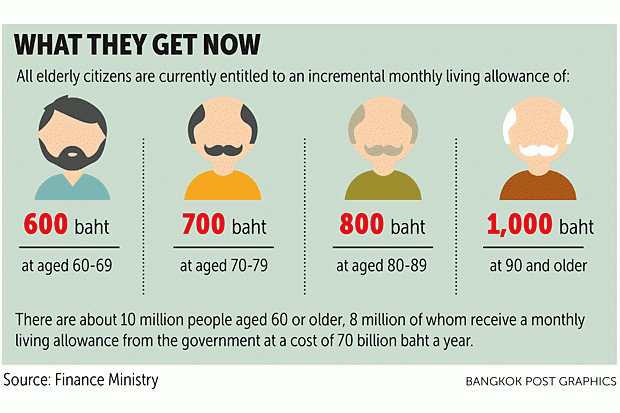Thailand: 2% sin tax hike to shore up safety net
The elderly poor are in line for a bigger monthly allowance after the cabinet approved a draft bill letting the government charge higher sin taxes.
Kobsak Phutrakul, assistant minister to the Prime Minister’s Office, said the cabinet yesterday agreed to raise the excise tax on liquor, beer and cigarettes by 2% to support the monthly living allowance for low-income seniors.
The government expects the hike to raise 4 billion baht, which will be directed to the monthly living allowance.
The bill will go to the Council of State for vetting in the next three months before advancing to the National Legislative Assembly, Mr Kobsak said.
Registrations for the subsidy and welfare scheme revealed that 2 million elderly have an annual income of 100,000 baht or less.
According to a Fiscal Policy Office report, those aged 60 and older will account for 20% of the total population by 2025, up from 14% in 2015.
The report said the state’s financial obligations to the Social Security Fund, the National Savings Fund (NSF) and the Government Pension Fund will rise to 698 billion baht combined in fiscal 2024 from 290 billion baht in fiscal 2016. Measures to care for the growing ranks of the elderly are among the government’s priorities. The goal is to let seniors live comfortably in post-retirement life while alleviating the state’s financial burden.
In 2015, the government successfully pushed for the establishment of the NSF, a voluntary retirement safety net for 25 million non-formal workers.
The cabinet last year approved a package awarding companies a double corporate tax deduction on expenses incurred from hiring ageing workers with a salary of 15,000 baht a month or less.
Other measures in the package included reverse mortgages — home loans that let the elderly convert their home equity into cash — and a mandatory provident fund to help retired senior citizens with living costs. At the moment, all elderly citizens are entitled to the step-up living allowance, with those aged 60-69 getting 600 baht a month, those 70-79 getting 700 baht, those 80-89 getting 800 baht and those 90 and older getting 1,000 baht.
There are roughly 10 million people aged 60 or older nationwide, 8 million of whom receive a monthly living allowance from the government. The state spends 70 billion baht annually to cover their living costs. The National Economic and Social Development Board (NESDB) predicts that the government will shoulder 1.4 trillion baht worth of social welfare spending in 2028, up from 400 billion in 2013.
The government is likely to bear a heavy load in taking care of an ageing society as the elderly population skyrockets over the next 19 years, the government’s planning unit said recently.
The NESDB said Thailand has 11.2 million elderly accounting for 17% of 65.52 million Thais. By 2036, that number will rise to 19.52 million or 30% of a total population of 65.10 million.
Thailand is defined as an “ageing society” because people aged 60 and older make up more than 10% of the total population.
Thanks to birth control efforts by previous governments, Thai births plummeted to 700,000 in 2015 from more than 1 million on average during 1963-83.
NESDB secretary-general Porametee Vimolsiri said the decline in working-age population bodes poorly for the country’s long-term economic growth and productivity.
“2018 will be the first year the elderly will outnumber the youth population,” he said. “Thailand desperately needs a prudent population management plan for the next 20 years, as the increasing elderly population will not only affect the country’s economic development, but also raise the government’s fiscal burden.”
Source: http://www.bangkokpost.com/business/news/1298171/2-sin-tax-hike-to-shore-up-safety-net


 English
English




